I Survived Brain Surgery. So Why Was I Worried About How I Looked?
How I got past society’s standards of beauty so I could focus on my recovery.
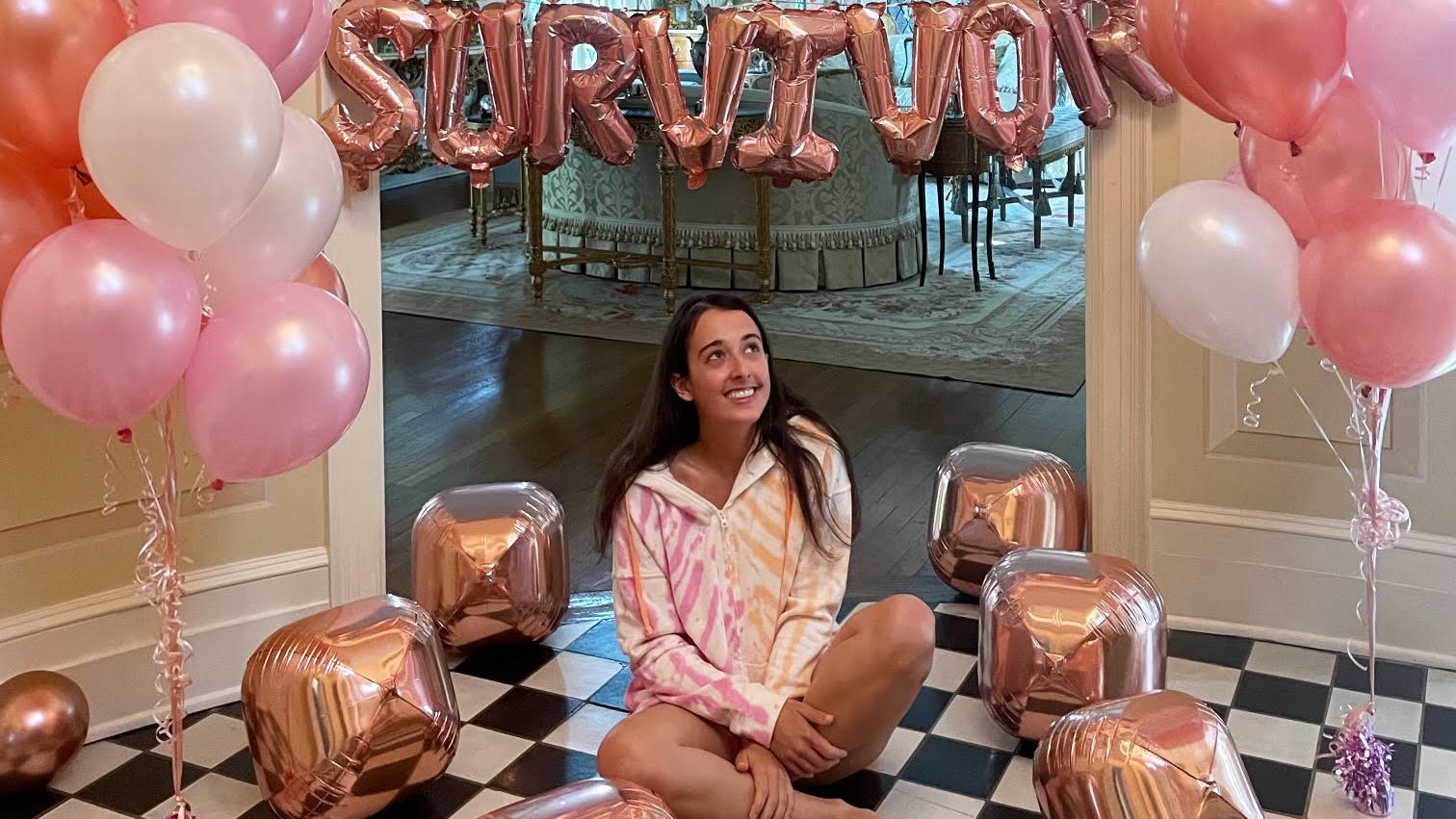

Nurses arrived to bring me to the operating room the morning of my brain surgery. I took a deep breath and hugged my dad extra tight and a little bit longer than usual. As they wheeled me away, I glanced back at him standing alone in the middle of the barren hallway, holding a plastic hospital bag full of my personal belongings. His nerves made him appear white as a ghost. In those split seconds, I realized that might be the last time I saw my father.
Rewind to 10 months before my brain surgery, when I’d first learned I had a hemorrhaging mass in my brain. I’d gone in for an MRI after waking up for work one morning, only to find the right side of my body completely numb. Before I knew it, I was dropping things and slurring my speech, as well. As a teacher working around young kids all day, I was scared. When my doctor called to tell me the results, it was like something out of my worst nightmare. Even the hypochondriac in me couldn’t believe this was happening. I had a benign tumor the size of a strawberry and they would have to operate to remove it.
The night before my surgery, we had a backyard get together with some close friends and family. I wanted to be distracted and surround myself with nothing but happiness. I practiced parting my hair in different ways to suit my soon-to-be new look which I knew would include a shaved patch and some staples. I took a moment of silence for my head as it was, untouched, that would soon be cracked open and put back together like a puzzle. I knew I would never be the same 24-year-old girl I was, but I didn’t realize how different I would become.
I was determined to stay as positive as possible. The day of my surgery, after saying goodbye to my dad, I turned up the Spotify playlist I’d created entitled, “You’ve Got This,” and lifted myself up on the cold operating room table.
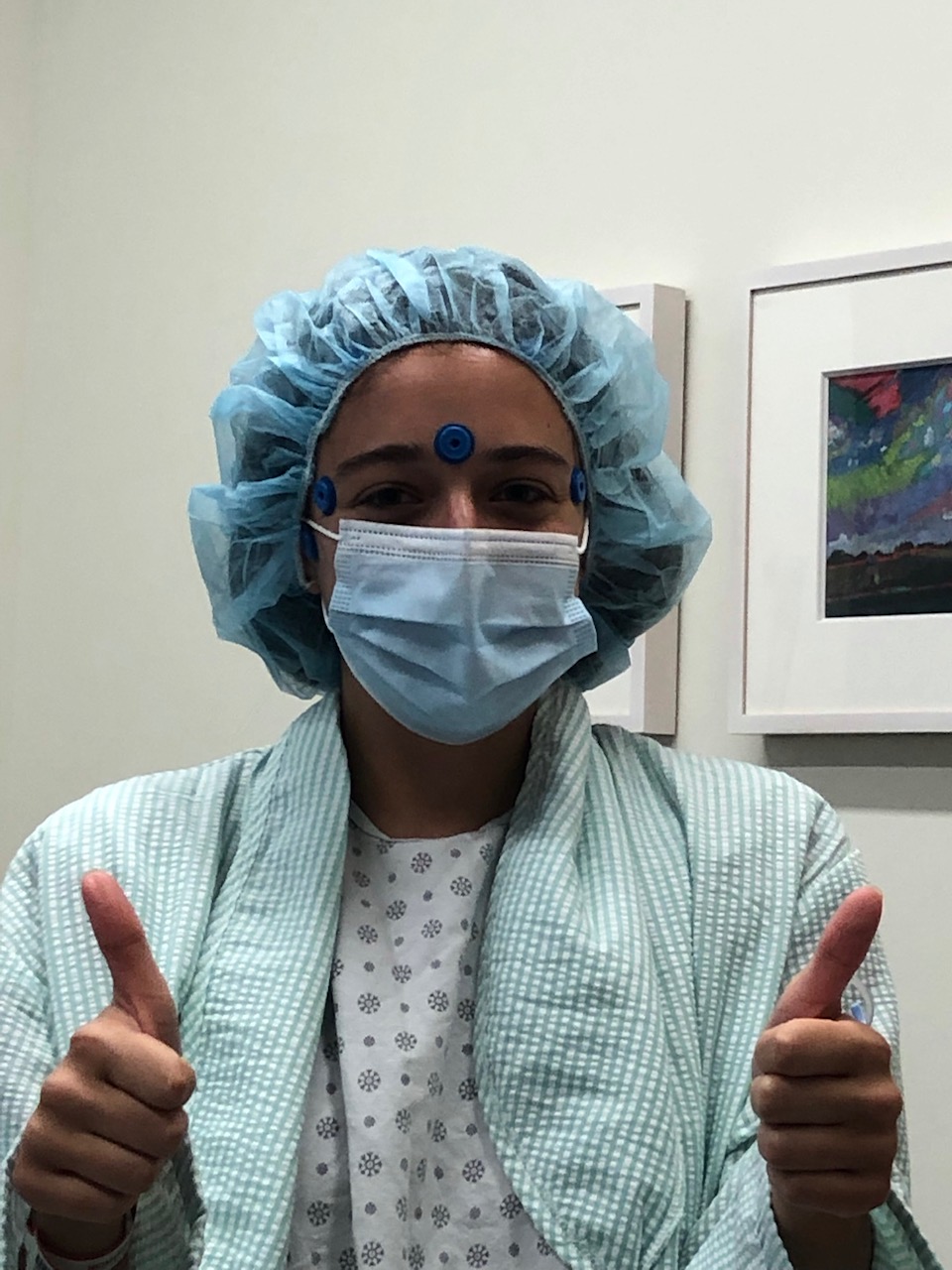
Danielle Soviero prepares for a six-hour operation to remove a tumor in her brain.
That’s when my surgeon stoically walked over to tell me the mass had tripled in size since my last scan, only one month ago. It was growing rapidly. Thoughts started flooding my head. Even minor surgeries come with risks, and this was a major one. Under those bright lights in my thin, itchy hospital gown, I made peace with the fact that these very well could be my last moments alive. But six hours later, I woke up in the Neurological Intensive Care Unit at New York’s Weill Cornell Medical Center. The surgery was a success.
My head was completely wrapped up in layers of thick, white gauze. I laid in bed, unable to speak. My surgeon had warned me of this possibility due to the depth and location of my tumor. The next few days were a blur. I was in and out of consciousness and struggling to communicate with anyone.
On day three, I was told I would be getting my head wrap removed. I didn’t think much of it, other than I was excited because it was becoming very uncomfortable.
Get exclusive access to fashion and beauty trends, hot-off-the-press celebrity news, and more.
After unraveling for what felt like forever, the nurse was finally finished. I suddenly felt a sensation of cold air hit my head—a feeling I had never felt before. I immediately brought my hands up to touch the top of my head, and I felt bare skin. I realized I was partially bald—eight inches long by two inches wide of pure scalp, not to mention the 40 silver staples in a perfect line across my head, from ear to ear. Originally, I thought only the left side of my head would be shaved in a small section, but because the tumor had grown, the surgeon was forced to make a much larger incision than anticipated.
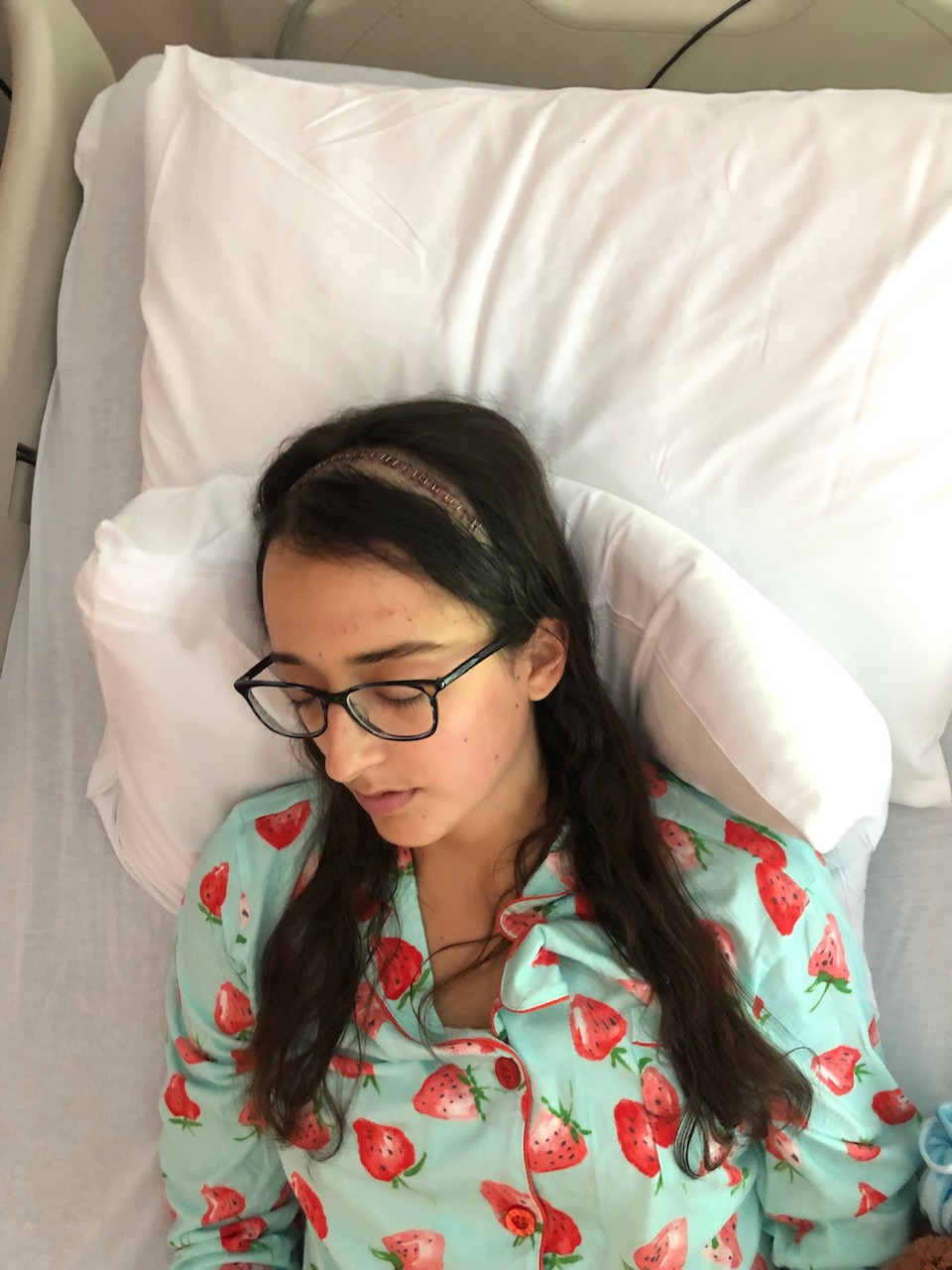
When she woke up from brain surgery, Danielle had a line of staples from ear to ear.
Nothing could have prepared me for that moment.
I began sobbing, uncontrollably. I remember thinking to myself, Am I going to be ugly? That was my first thought. I had just undergone brain surgery to save my life, yet all I could think about was the way other people would now perceive me.
We live in a society where we have all been trained to put so much emphasis on outward appearance and superficial beauty that even in the most fragile of times, I couldn’t see past the way I looked.
This newfound insecurity was the toughest pill to swallow, and let me tell you—I was swallowing all sorts of pills at the time.
As a woman, my long hair symbolized beauty, femininity, and confidence. I couldn’t help but question, what was I without all of my hair? I kept reminding myself that hair grows back and this would just be temporary. But I still didn’t want to look at myself in the mirror.
A few days later, my sister was pampering me in my hospital bed. She brought my entire skincare routine down to the serums and tinctures, and even some lipgloss to make me feel good about myself. When I finally mustered up the confidence to face my reflection that day for the first time, she walked me over to the mirror and I opened my eyes.
I didn’t recognize myself, and that was the most upsetting part.
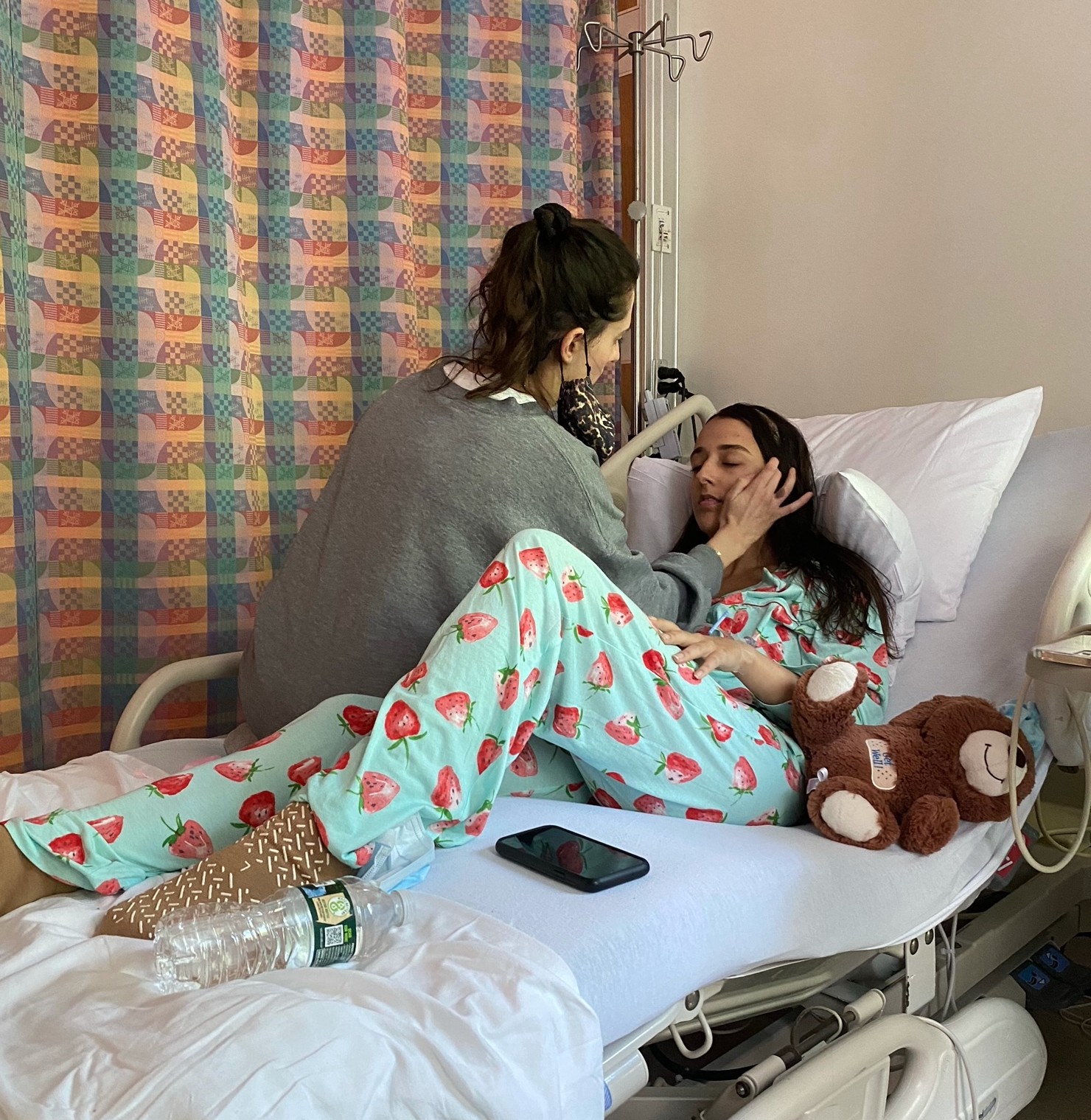
Danielle's sister came to visit her in the hospital, bringing her skincare routine from home.
There was nothing beautiful about me. I had a three-inch scar above my left eyebrow, from the skull clamp that was used to keep me still during surgery. I was sickly pale, not typical for my olive-toned skin in mid-July. My arms were covered in bruises because of the twice-daily shots of anti-blood clot medication. The veins in my hands were completely blue and stuck with IVs. My cheeks were flushed and my face swollen from the strong steroid I was on. I had a catheter because I couldn’t get out of bed without assistance. My stomach was bloated from the plethora of medication and all of the fluid retention that happens post surgery, and I had developed an itchy, red rash all over my body from a reaction to one of my pills.
I was horrified. I’m not sure what I expected to look like after brain surgery, but it certainly wasn’t this.
I laid in bed unable to speak out loud what I was feeling. I was incredibly insecure. This was a challenge for me because, overall, I am a fairly confident person. I embrace my “flaws.” I am aware that we aren’t all built the same and we aren’t supposed to look alike. This newfound insecurity was the toughest pill to swallow, and let me tell you—I was swallowing all sorts of pills at the time.
After I was discharged from the hospital, I was too insecure to leave the house. I didn’t want anyone to see me. If I did have to go out, I wore a hat or headband to cover my head.
I needed to make a shift in my mindset, or else my recovery would be burdened with the stress of the way I looked. I had been committed to positivity since the moment I found out about the lesion, so why should that stop now? I was about to face the most difficult challenge I had ever gone through: Not only was I unable to speak, but I also couldn’t feed myself, walk independently, sleep, or shower alone. I was seeing a physical therapist, occupational therapist, and speech therapist twice a week, and I was exhausted. I had a lot on my plate. So, I told myself daily affirmations, and I thought about the moments before my surgery. As I laid on that operating table, mentally preparing for the absolute worst, I wasn’t at all concerned with the way I looked. I’d thought about my family, my friends, my dogs, memories of nights spent laughing and dancing with the people I love. I’d thought about what kind of person I would be remembered as: someone who is kind, intelligent, genuine, positive, loyal, and honest.
I reminded myself that this same body that I was so self conscious of, has gotten me through so much. My body had just endured the toughest feat of all: brain surgery. Tan skin, thick hair, or a flat stomach weren’t the things that made me beautiful. I was beautiful because I was positive. I was beautiful because I was strong. I was beautiful because I was courageous. I was beautiful because I was brave.
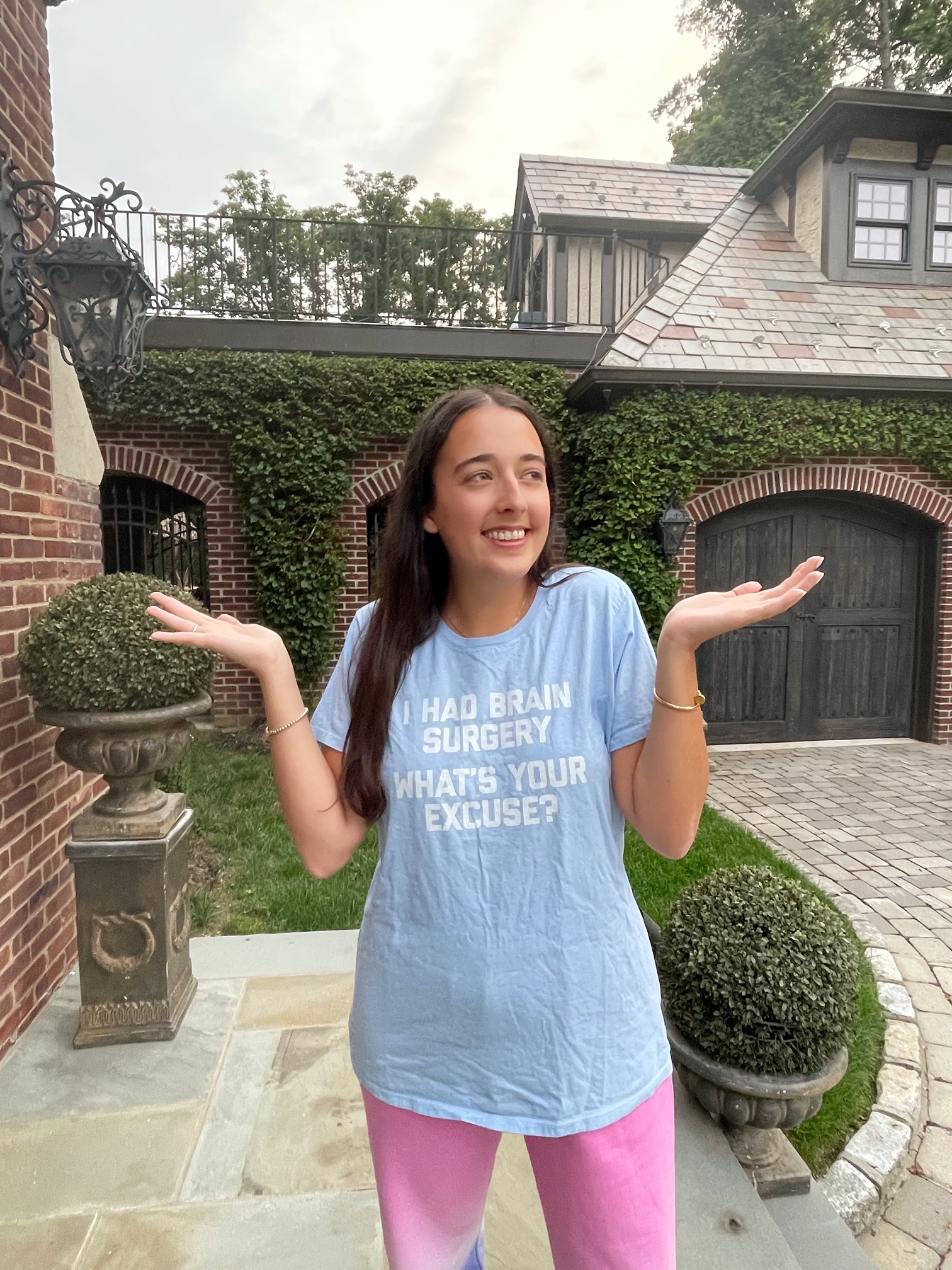
After her surgery, Danielle faced months of recovery.
Now, eight months into my recovery, my hair is growing back slowly but surely. I no longer cover my head. My new hair growth pokes straight up vertically from my scalp—I call those little three-inch hairs my “tweety birds.” I have a small bump that can be felt under the skin of my head—that is the titanium screw that was used to put my skull back together. It will forever be a reminder of my strength. My scar can only be seen if I move my hair out of the way. That long, perfectly straight, pink line is a reminder of my courage. And every time I fumble my words, or stutter my speech, or forget my thoughts—though frustrating—it is a reminder of my bravery. I wear it all with pride.
My surgery made me realize life is precious and short, so why spend it worrying about such peripheral things, like the way we look? Now, looking back, I can see I’m not the same young girl I was before surgery. I am an even more confident, more powerful, stronger woman than I ever thought was possible. And at the end of the day, that really is beauty in its greatest form.

Danielle Soviero is a former preschool teacher turned freelance writer living in New York. She is an avid advocate for brain health. Her story has been covered by news outlets including Health, Today, and People. Her work has been featured on Prevention and Guest of a Guest.